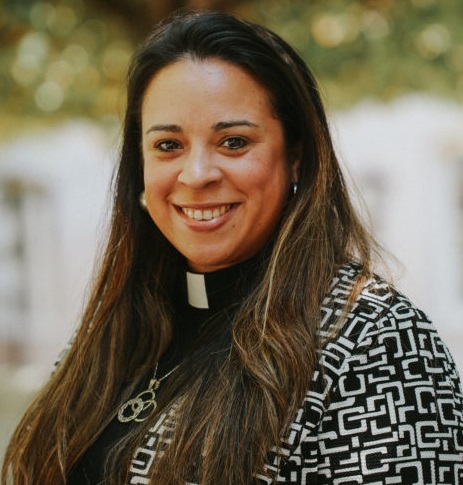Commentary on John 8:31-36
The Reformation story is one of commuting and converting from one theological worldview to another.
[This commentary can also be read in Spanish here.]
It began over 500 years ago and continues through us each time we speak the truth of Jesus Christ.
In the text for Reformation Sunday 2020, we are spectators and listeners along with fellow believers. We are inquisitive and in wonderment—trying to understand how Jesus matters in our lives and in our daily living.
Jesus sees us and knows that when we are overwhelmed with the world around us, we often neglect the Word in which our faith is rooted. We forget who we are as baptized children of God and how we are called to follow our teacher par excellence.
And so Jesus reminds us, “If you continue in my word, you are truly my disciples.” He reminds us that discipleship does not come as a result of membership in a congregation or denomination but by following and continuing in God’s living and dynamic word—not by memorizing or utilizing it for personal or collective gain, but by dwelling and sitting with the word as a word that reveals what our souls so desperately crave: freedom.
Jesus sees us and speaks to us as ones who are bound, yet ignorant to our enslavement to sin. Jesus notes that to continue in his word and being his disciple leads to a new awareness—a new knowing; it grants the realization of the truth of the gospel of Jesus Christ for the self and all creation; it grants the promise of liberation and transformation; the promise of freedom.
Freedom matters.
It matters to a person, a people, a system. It matters that every member of the human and created family is not bound by systemic evil; by historical and socio-political constructs that deny dignity to some and grant privilege to others.
It matters that people and communities are not theologically and institutionally enslaved to an oppressed and oppressive way of being, thinking, and behaving. It matters that those who claim to believe in Jesus not fall in the trappings of the enemy and mistaken the God of the universe as one who places conditions upon God’s love, grace, and salvation.
This Reformation Sunday I hear Jesus’ word saying, “Continue in my word, be my disciple, and know the truth … because freedom matters. It matters that you, your people, creation, and systems be set free—my truth will set you free.”
In the spring of 2005, I was in my second semester of seminary at what was then the Lutheran Theological Seminary in Philadelphia. I was raised in the Pentecostal church, was confident in my theology, and stubborn enough not to let myself be affected by Lutheran teaching in this setting. But then God happened in a way I could not deny.
I was sitting in Lutheran Confessions after three weeks of turning in reflection papers that each came back with red marks and sad faces next to every paragraph that resisted and rejected unconditional love and grace or wherever I was the actor behind my salvation. I was deeply offended and frustrated. I questioned why I was there and if I should stay. I was convinced that I knew Jesus, the Bible, and solid theology. I was also convinced the professor knew nothing about “true relationship” with Christ.
I was poorly mistaken on all accounts.
On this particular day the professor was talking about justification by faith through grace- an idea I knew but had never truly understood. As he spoke, I listened and took notes. Then I witnessed him walk away from his manuscript and gesture in my direction. He said, “When you understand that God chose for you to be saved and that you did not choose your own salvation, then you’ll understand God’s amazing grace.”
These may sound like simple words, but those words pierced my heart like a sword. I had never heard such a thing. And yet, I remember thinking, “What he just said is true.” My spirit knew those “simple” words contained the truth.
I had been raised to believe I had to chase and choose Christ on a daily basis. I lived hoping my pursuit would be enough to get God’s attention that I might be saved from eternal damnation. I believed God’s love and grace was for me, but only if I did certain things and behaved in a certain way. I was bound by theological and institutional misinterpretations of Scripture, God, and our relationship to and with God. Once I heard the truth spoken in a sentence inspired by the Holy Spirit, I was set free.
I knew instantly this word of grace was the word I would preach my whole life long. From then on, my devotion to Christ was not as a result of fear of damnation but instead, as a result of true gratitude for a salvation that was chosen for me and not by me.
I often refer to this moment in the classroom as my conversion moment to Lutheran theology as my personal liberation theology. Mainly, because my spirit experienced the truth of the gospel and it became my freedom and liberation: it became the vehicle for my commute and conversion from one theological worldview to another.
This is what the word of God does. This is what the gospel of Jesus Christ does. This is the outcome of engagement with truth proper, namely Jesus Christ.
Dear preacher, our homes, our people, our church, our country, our world—and our spirits—crave freedom from bondage, from enslavement to sin and systemic evil, from misinterpretation of Scripture, God, and God in relation to creation. We all need the truth to reign and set us free. We all need liberation and transformation. We all need Jesus.
May we continue in God’s word.
May we be disciples of truth proper, Jesus Christ.
And may we know the truth and be set free … with God’s help and in Jesus’ name. Amen.


October 25, 2020